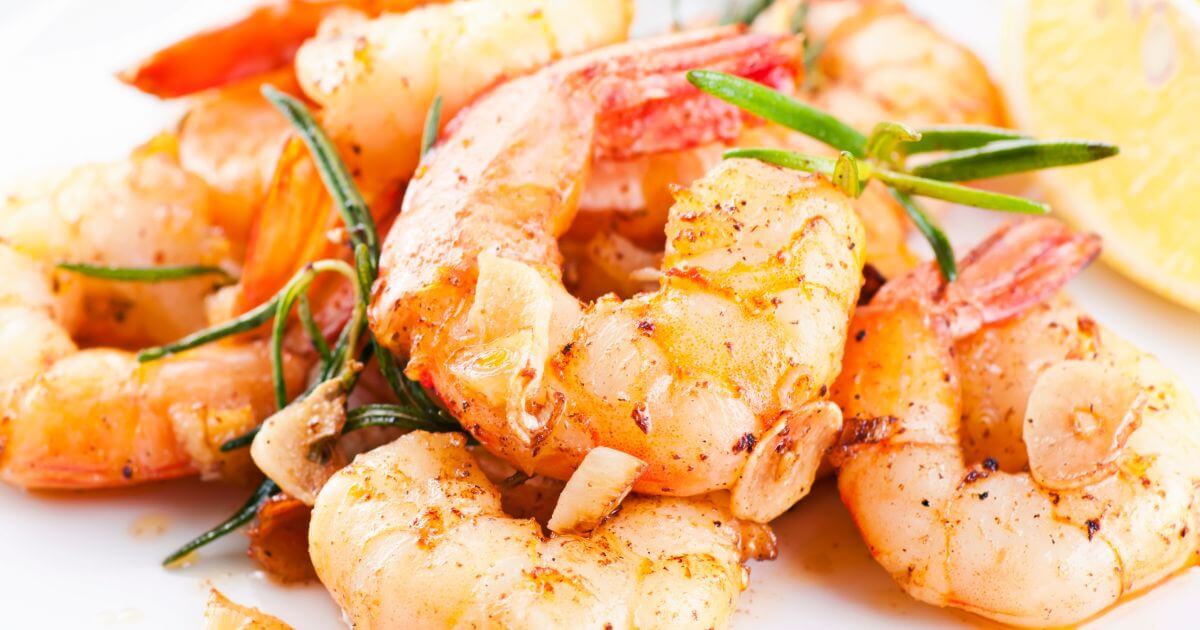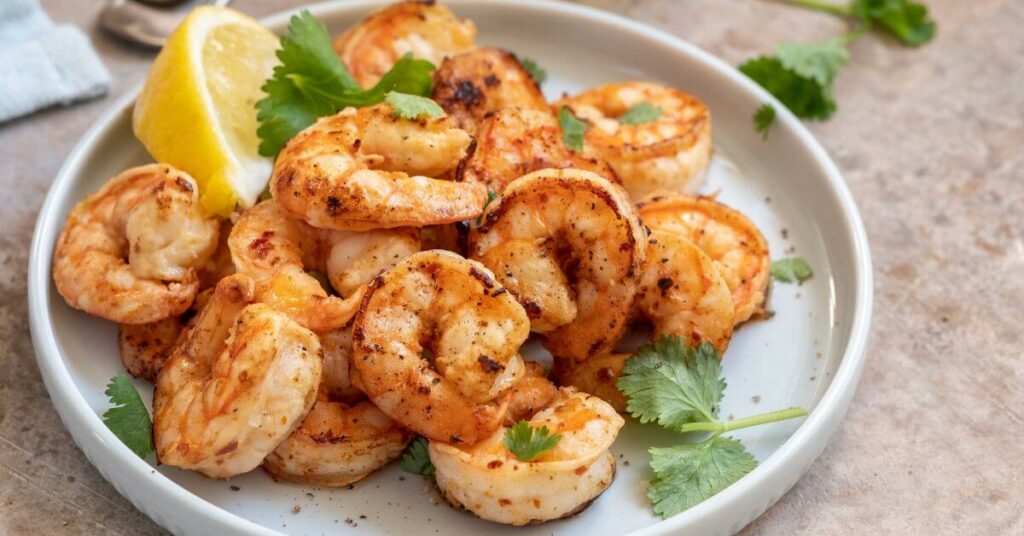If you’re trying to lose weight, you might be looking for foods that are high in protein, low in calories, and nutritious. Shrimp definitely fits that bill. This little seafood powerhouse packs a big punch of protein while being low in calories and carbs. But just how is shrimp good for weight loss?
Shrimp is known for being low in calories and high in protein, making it a popular choice for those trying to watch their waistline. However, some people worry about the cholesterol content in shrimp, leading to the question of whether it is truly a good option for weight loss.
If you’re wondering if shrimp is a good choice for your weight loss journey, it’s important to consider all aspects of this seafood option. Understanding the nutritional value of shrimp and how it fits into your overall diet plan can help you make an informed decision about whether or not shrimp should be a staple in your weight loss strategy.
Nutritional Value Of Shrimp
The first question you need to answer is, “Is shrimp good for weight loss? In order to answer this question, you must first answer this question: “How many calories are in shrimp?” ” These are the nutritional values of 100 grams (3.5 ounces) of cooked shrimp:
- 99 calories
- 24g protein
- 0.3g fat
- 0.2g carbohydrate
In addition, shrimp is a great source of the following minerals:
- Calcium
- Iron
- Magnesium
- Phosphorus
- Potassium
- Selenium
- Sodium
- Zinc
Shrimp is low in calories and high in protein, making it a great option for a high-protein diet. It is also low in carbs, making it suitable for low-carb diets like Keto. Shrimp is low in fat and a good choice for low-fat diets. It is rich in essential minerals and can help prevent nutrient deficiencies while keeping caloric intake low.
Shrimp is Packed with Protein
One of the shrimp’s biggest advantages for weight loss is its high protein content. With 20 grams of protein in a 3.5-ounce serving, shrimp has more protein than an equal portion of chicken or lean beef.
Protein is thermogenic, meaning it increases your metabolism slightly and requires more calories to digest than fats or carbs. You can also retain lean muscle mass while losing weight, which helps you keep your metabolism moving.
But perhaps protein’s greatest benefit to weight loss is its capacity to boost feelings of fullness and satisfaction. By increasing levels of appetite-reducing hormones like cholecystokinin, glucagon-like peptide-1, and peptide YY, protein makes you feel fuller compared to fats and carbs.
Multiple studies have shown that increasing protein intake can boost metabolism, reduce appetite, and promote weight loss, especially when combined with calorie restriction. Adding lean protein sources like shrimp to your diet can maximize the satiety and metabolic advantages of higher protein intakes.
Shrimp is Low in Calories and Carbs
In addition to being loaded with protein, shrimp is very low in both calories and carbs. This makes it ideal for low-calorie or low-carb weight loss diets.
The low-calorie density of shrimp means you can consume a large portion while taking in relatively few calories. For example, a 6-ounce serving of shrimp has around 180 calories, allowing you to eat a pretty substantial amount of food for just a small percentage of your daily calorie budget.
The low-carb content of shrimp is also advantageous for weight loss. Cutting carbs has been repeatedly shown to reduce appetite and promote greater fat loss compared to higher-carb diets. Since shrimp contains practically no carbohydrates, it can easily be incorporated into low-carb eating patterns like keto or Atkins.
Glycemic index and glycemic load are two other measures of how foods affect blood sugar levels. Shrimp scores a 0 on both, making it one of the most diabetes and weight-loss-friendly foods available.
For these reasons, shrimp can be enjoyed freely on just about any healthy weight loss diet without offsetting your calorie or carb intake too much.
Other Health Benefits of Shrimp
In addition to its slimming effects, shrimp provides several other important nutrients that can benefit overall health:
- Selenium – An antioxidant that plays a key role in thyroid health, immune function, and cancer prevention. Shrimp is one of the best food sources of selenium.
- Iodine – Critical for proper thyroid function and metabolism. Many people are deficient in iodine, and shrimp can help meet iodine needs.
- Omega-3s – Shrimp contains the omega-3 fatty acids EPA and DHA, which reduce inflammation, lower disease risk, and may aid weight loss.
- Vitamin B12 – This essential B vitamin is vital for energy, red blood cell formation, and neurological function. Shrimp is one of the only non-fortified dietary sources of B12.
- Astaxanthin – A powerful antioxidant that gives shrimp its reddish-pink color. It has been linked to benefits like reduced inflammation and UV protection.
- Low Mercury – Unlike many larger fish species, shrimp contains very low levels of mercury, making it a safer seafood choice.
Shrimp is also relatively inexpensive and widely available year-round, making it an accessible protein option for most people.
Potential Downsides of Shrimp
Despite shrimp’s many nutritional advantages, there are a few potential downsides to consider:
- Cholesterol – With over 160 mg of cholesterol per serving, shrimp is very high in dietary cholesterol. For most people, this is not an issue, but those with certain conditions like diabetes may need to limit high-cholesterol foods.
- Sodium – Some shrimp preparations, like shrimp scampi, can be very high in sodium, especially if using packaged sauces or seasonings. Be mindful of added salt and sodium when cooking shrimp.
- Mercury – While much lower than many fish, shrimp does contain traceable levels of mercury. Moderation is key for limiting mercury exposure from seafood.
- Allergies – Shrimp is a relatively common food allergen. Those with shellfish allergies should obviously avoid shrimp.
Healthy Ways to Prepare Shrimp
To maximize the weight loss benefits and nutritional quality of shrimp, it’s best to avoid heavy breading or calorie-dense sauces when preparing it. Some lighter and healthier cooking methods include:
- Grilled shrimp skewers
- Shrimp stir-fries with vegetables
- Baked shrimp with garlic, lemon, and herbs
- Shrimp lettuce wraps
- Cold shrimp cocktail
- Shrimp scampi with whole grain or zucchini noodles
Shrimp pairs nicely with a wide variety of vegetables, whole grains, and lighter sauces or seasonings. Just be mindful of not adding a ton of butter or cream sauces or deep frying, which can turn shrimp into a high-calorie dish.
Is Shrimp Healthy?

Shrimp is often lauded as a healthy seafood option, and for good reason. This little crustacean packs a nutritional punch with many impressive health benefits.
One of the biggest advantages of shrimp is its high protein content. A 3.5-ounce serving contains an impressive 20 grams of lean, complete protein. Protein is essential for building and repairing tissues and has been shown to increase feelings of fullness.
Shrimp is also loaded with other important nutrients. It’s an excellent source of selenium, providing over 50% of the daily recommended intake in one serving. Selenium is an antioxidant that supports thyroid function and immune health. Shrimp also provides generous amounts of iodine, vitamin B12, and beneficial omega-3 fatty acids.
Additionally, shrimp contains astaxanthin, a powerful antioxidant that gives shrimp its reddish-pink color. Astaxanthin has been linked to benefits like reduced inflammation and UV protection for the skin and eyes.
Another major health benefit of shrimp is its low mercury levels compared to many other seafood options. This makes shrimp safer to consume regularly without risking mercury toxicity.
The main potential downside of shrimp is its higher cholesterol content, with 166 mg per serving. However, research shows dietary cholesterol has little impact on blood cholesterol levels for most people.
Overall, with its lean protein, vitamin and mineral content, antioxidants like selenium and astaxanthin, and low mercury levels, shrimp can absolutely be considered a healthy food to include in a balanced diet.
Is Shrimp Good For Weight Loss?
There are questions about whether eating shrimp can cause weight gain or if shrimp is good for weight loss. The answer is, if prepared and consumed in moderation, shrimps can be a great dietary choice for weight loss. Shrimps are high in essential minerals and protein, but low in calories, making them a healthy option to help burn fat and maintain lean muscle mass.
Protein helps you feel full, which is important for weight loss. Shrimp is low in carbs and fats, making it good for managing weight. However, eating too much protein and too few carbs can lead to health issues over time. Fried shrimp is high in calories and not healthy, especially in large amounts.
FAQs
1. Can I Lose Weight If I Eat Shrimp?
Yes, shrimp can aid weight loss due to its high protein, low calorie, and low carb content. Enjoy shrimp as part of a calorie-controlled, nutritious diet for slimming benefits.
2. Is Shrimp Healthier Than Chicken?
While both shrimp and chicken are nutritious protein sources, shrimp has some health advantages. Shrimp is lower in calories and fat yet higher in metabolism-boosting protein per serving. It’s richer in nutrients like selenium, iodine, and omega-3s. Shrimp also contains powerful antioxidants like astaxanthin absent in chicken. However, chicken is lower in cholesterol. Overall, shrimp’s nutritional profile makes it a slightly healthier option.
3. How Many Calories In Shrimp?
A 3.5-ounce (100-gram) serving of cooked shrimp contains just 99 calories yet provides a hefty 20 grams of protein. This makes shrimp an excellent low-calorie, high-protein food for weight loss.
4. Is Shrimp Fried Rice Good For Weight Loss?
The calorie content of shrimp fried rice varies depending on serving size. A 1-cup serving contains 339 calories, with 238 from fried rice and 101 from shrimp. It also has 5.4 grams of fat, of which only 1 gram is saturated fat, and 24.5 grams of protein. Overall, fried rice can be a good option for weight loss, depending on portion size.
The Bottom Line on Shrimp for Weight Loss
Overall, shrimp appears to be an excellent food for weight loss and weight management. Its high-protein, low-calorie, low-carb nutrition profile, combined with proven benefits for appetite control and metabolism, make it an ideal slimming protein source.
Of course, no single food is a weight loss miracle, and shrimp should be consumed as part of an overall balanced, calorie-controlled eating plan. But its unique nutritional qualities give shrimp a definite edge over many other proteins when your goal is shedding excess weight or preventing weight regain.
So feel free to make shrimp a regular part of your weight loss diet. It’s a nutritious, delicious, and diet-friendly seafood that provides many health advantages beyond just its slimming effects. Add shrimp to salads, stir-fries, and whole grain dishes, or enjoy it as a stand-alone lean protein, and you’ll be well on your way to successful, sustainable weight loss.
